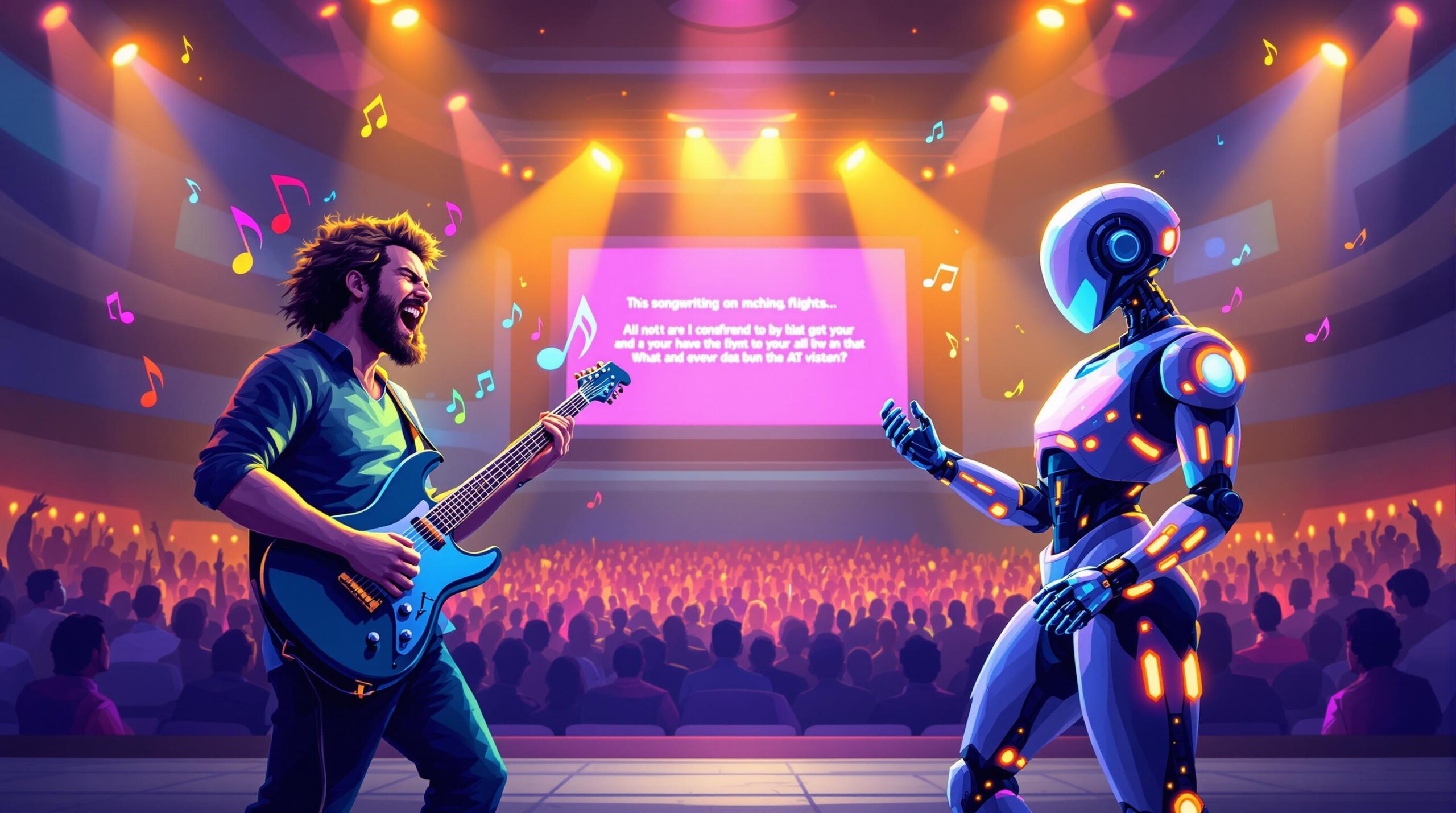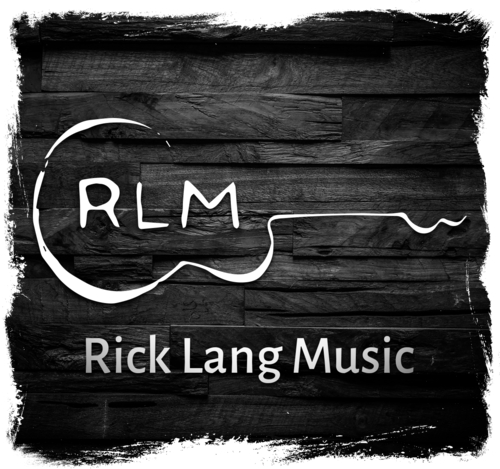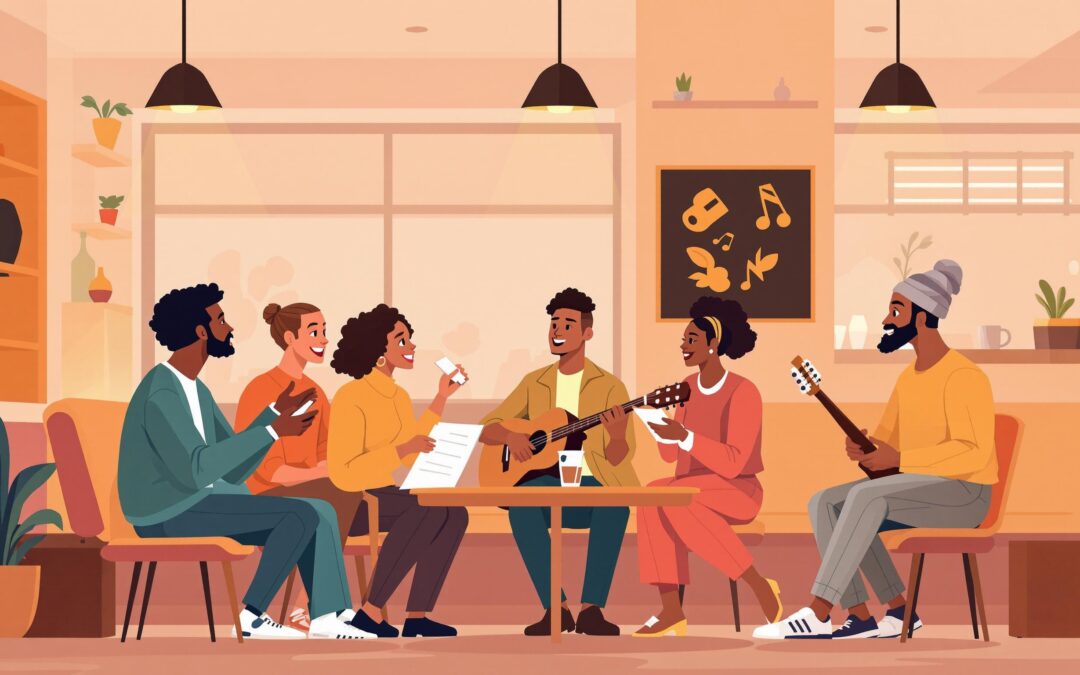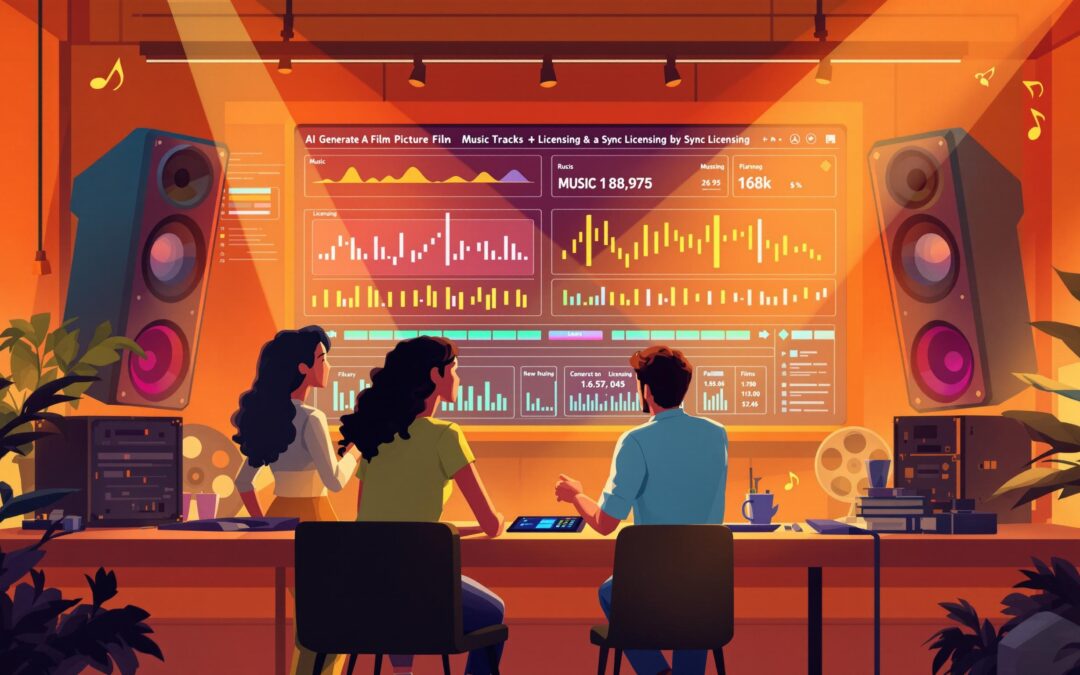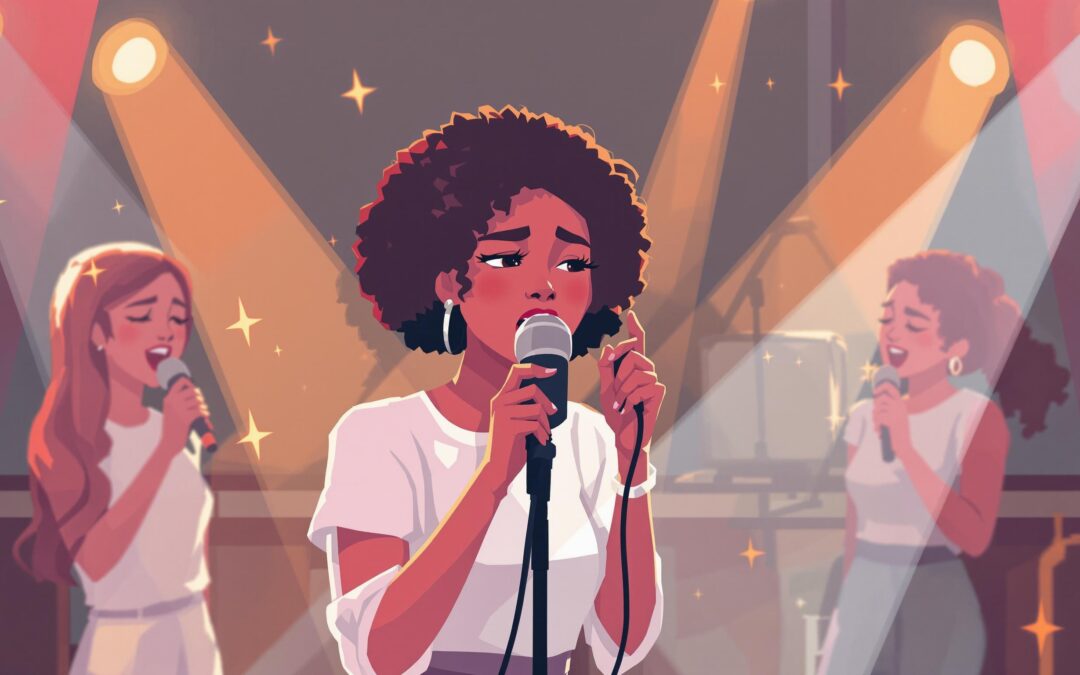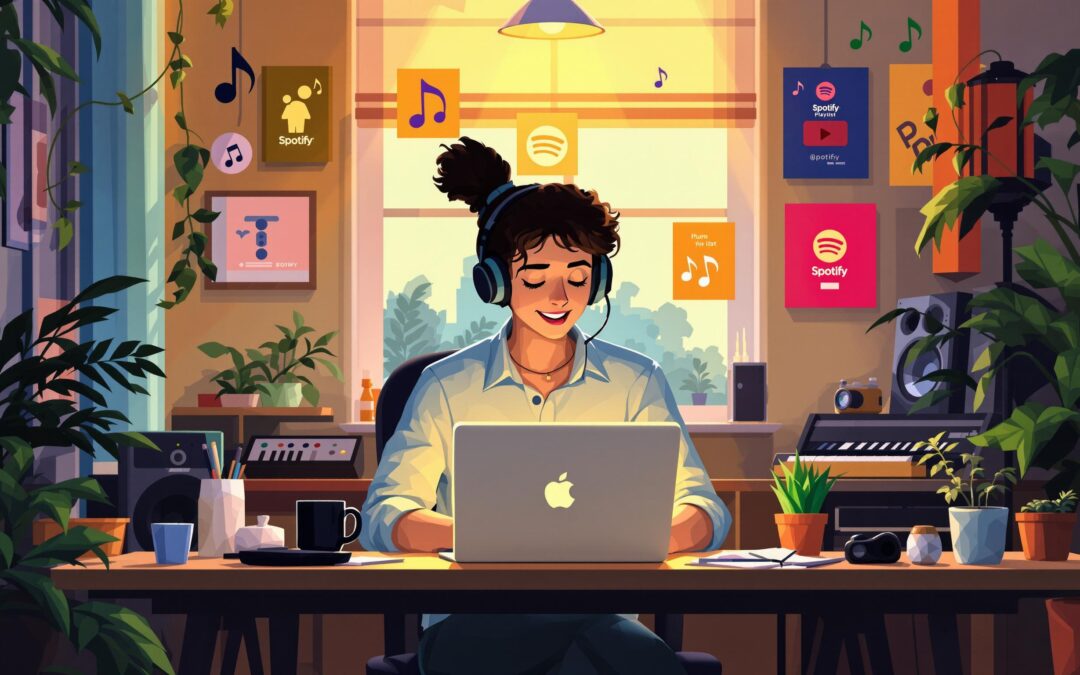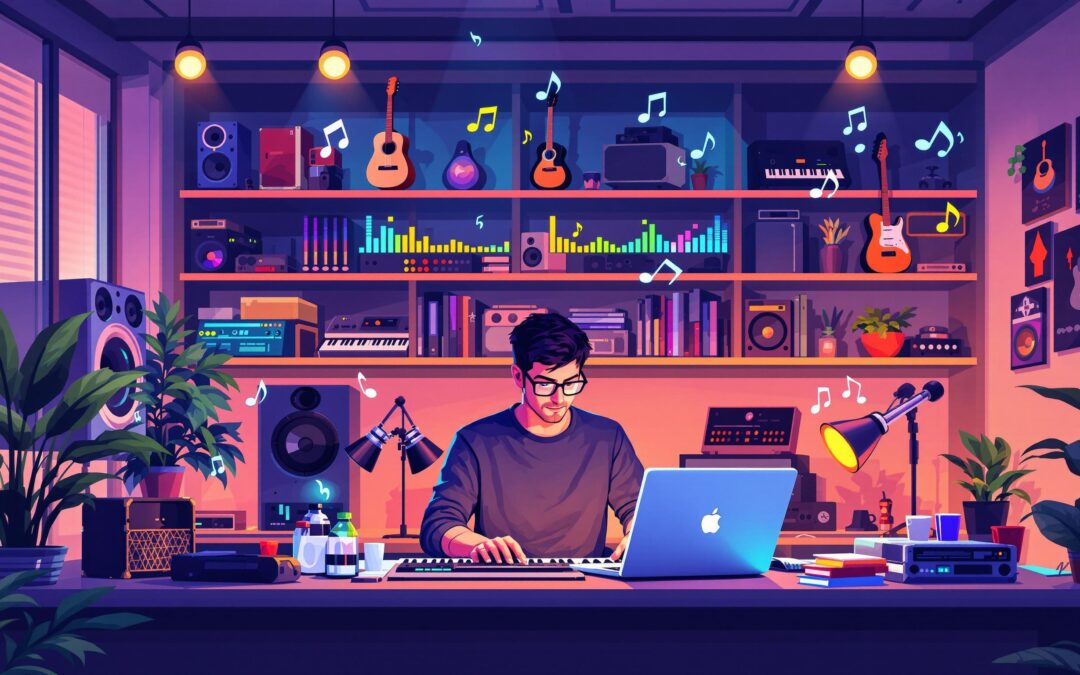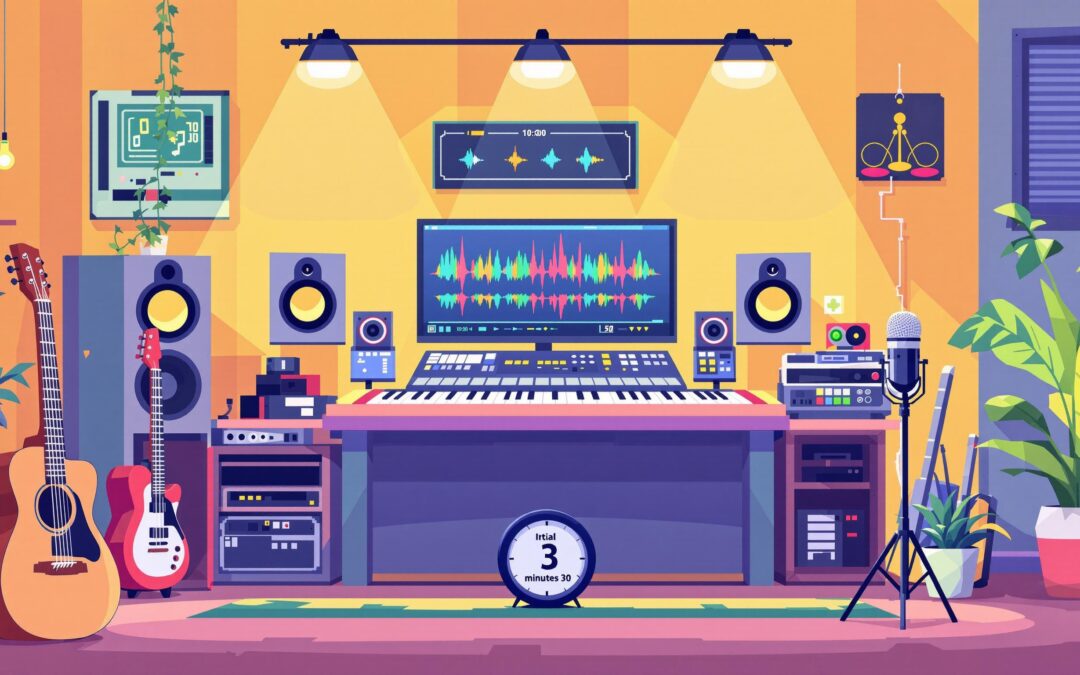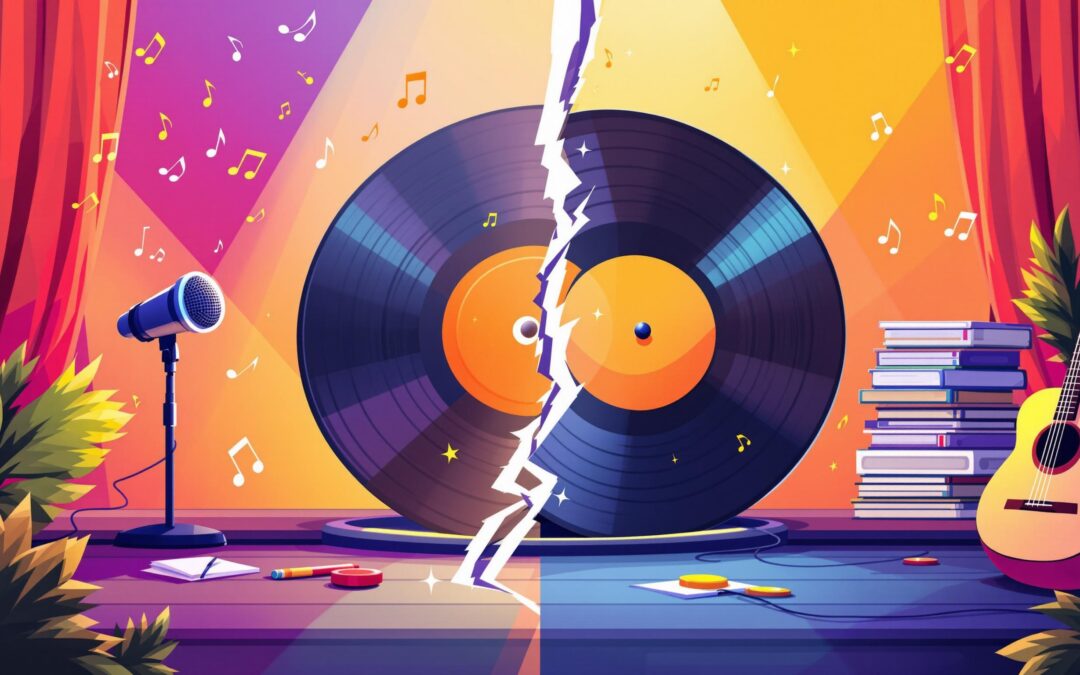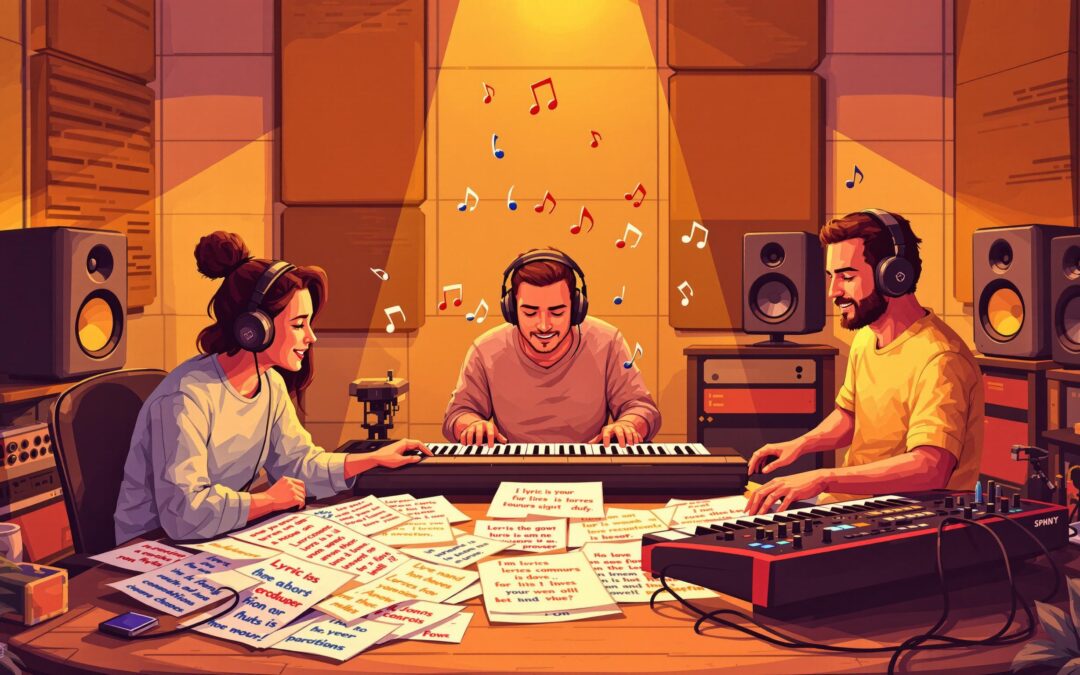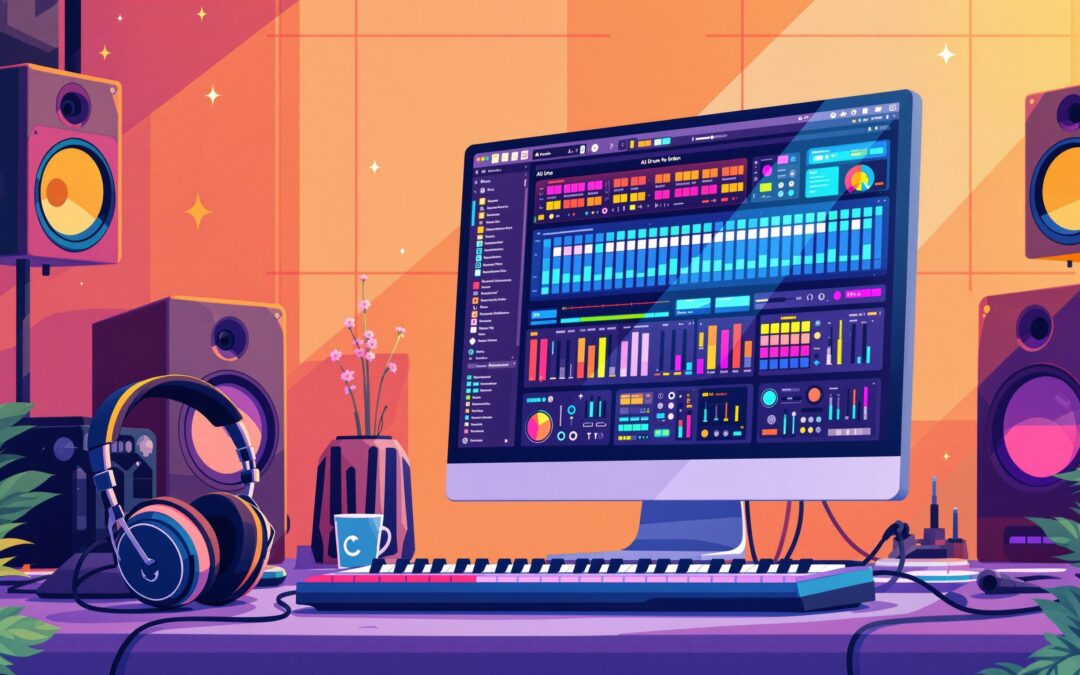Artificial intelligence is transforming songwriting in 2025, but can it truly rival human creativity? Here’s the quick breakdown:
- AI Strengths: AI tools like AIVA and Logic Pro 2 generate melodies, harmonies, and lyrics in seconds, analyze vast musical data, and support diverse genres. They enhance productivity and simplify collaboration.
- Human Strengths: Human songwriters bring emotional depth, personal storytelling, and cultural context that AI struggles to replicate.
- Key Comparison:
- Speed: AI wins with instant composition.
- Emotional Impact: Humans excel at conveying genuine feelings.
- Creativity: AI uses patterns; humans innovate beyond them.
Quick Comparison Table
| Aspect | AI Capabilities | Human Capabilities |
|---|---|---|
| Speed | Instant song creation | Days to weeks |
| Emotional Depth | Limited | Strong, personal connections |
| Innovation | Pattern-based combinations | Rule-breaking, unique ideas |
| Technical Precision | Consistently accurate | Enriched by artistic intent |
AI tools are becoming essential collaborators, but human creativity remains irreplaceable for crafting music that connects deeply. The future lies in a balance between AI efficiency and human artistry.
AI vs Musicians: Is Writing Music TOO Easy Now?
AI Songwriting Evolution
AI music creation has come a long way, evolving from basic melody generators to tools that can work as creative partners. This progress has been fueled by technological advancements and the changing needs of the music industry.
AI Music Timeline
In 2018, Taryn Southern released "I AM AI," the first album entirely composed by artificial intelligence . A year later, AIVA’s compositions were featured in "Brexit: The Uncivil War," showcasing that AI could meet professional music standards . Fast forward to 2023, the AI music market was valued at $3.9 billion, with projections suggesting it could grow to $38.7 billion by 2033, driven by an annual growth rate of 25.8% .
Top AI Music Tools in 2025
Today’s leading AI music platforms demonstrate the range of possibilities in music production. Here are some standout tools:
| Platform | Key Features | Best Use Case |
|---|---|---|
| Soundverse | Diffusion models, transformers | Professional composition |
| Logic Pro 2 | AI session musicians, stem separation | Studio production |
| AIVA | Symbolic music generation | Classical composition |
| Musicfy | Quick generation, simple interface | Background music |
A notable development came in May 2024 when Apple launched Logic Pro 2, introducing AI session musicians. These virtual performers – a drummer, keyboardist, and bassist – can accompany compositions based on chord progressions and rhythms, adding a dynamic layer to studio production [Apple App Store, 2024].
Recent Technical Progress
AI songwriting tools now benefit from cutting-edge technologies that enhance their capabilities:
- Natural Language Processing (NLP): Refines lyric generation by better understanding song structures .
- Advanced Algorithms: Analyzes chord progressions across various genres to create diverse compositions .
- Deep Learning: Improves recognition of melodic, harmonic, and rhythmic patterns, ensuring high-quality output .
These tools can instantly process vast musical databases, offering endless inspiration while maintaining a professional level of quality. Additionally, AI systems now analyze streaming data and social media trends to understand audience preferences. Features like NFT integration and personalized music options are opening up new revenue opportunities . This technological progress is paving the way for AI to stand alongside traditional human songwriting methods.
Human Songwriting Methods
Human songwriting stands out for its emotional depth and the ability to connect on a personal level. Exploring these methods helps explain why music created by humans continues to resonate so strongly with listeners.
Personal Expression in Songs
Songwriters often channel their personal experiences into music, creating a connection that AI struggles to imitate. Take this example from a university student:
"During times when I have felt down, all I had to do was write dark lyrics and I all of a sudden felt cured. In times when I was happy, nothing felt better than reflecting on my happiness through song." – Joseph, University Student
This deeply personal approach allows songwriters to craft music that feels genuine and relatable.
Working with Other Writers
Collaborative songwriting brings together different perspectives and styles, often leading to richer compositions. The success of this process relies on several key factors:
| Component | Purpose | Impact |
|---|---|---|
| Clear Communication | Define shared goals | Keeps everyone aligned |
| Active Listening | Exchange ideas | Enhances creativity |
| Fair Credit | Recognize contributions | Builds trust |
| Conflict Resolution | Address disagreements | Strengthens teamwork |
"As a seasoned songwriter, I’ve found that one of the most rewarding experiences in my career is collaborative songwriting. It’s not just about combining creative forces, but also about learning, growing, and pushing boundaries together."
This teamwork complements the raw, introspective nature of individual songwriting.
Social and Historical Context
Incorporating cultural and historical elements allows songwriters to create music with deeper meaning. Reggae, for instance, became a powerful voice for social change, with artists like Bob Marley blending storytelling with cultural identity . Today’s songwriters continue this tradition, addressing modern issues through their unique perspectives.
These distinctly human approaches – personal storytelling, collaboration, and cultural awareness – highlight the contrast between human creativity and AI’s algorithm-driven methods. This sets the stage for a closer examination of their differences.
sbb-itb-1c6af30
What AI Can Do in 2025
This section dives into what AI can – and cannot – do in the world of music creation as of 2025.
AI’s Strengths
AI songwriting tools have become powerful allies for songwriters, offering quick idea generation and pattern analysis.
| Feature | Capability | Impact on Songwriting |
|---|---|---|
| Speed | Generates ideas in seconds | Speeds up the creative process |
| Data Analysis | Processes massive amounts of musical data | Suggests new and interesting combinations |
| Genre Flexibility | Works across many styles | Supports diverse composition needs |
| Collaboration | Simplifies sharing and editing | Makes teamwork smoother |
"AI isn’t here to take over your songwriting completely – it’s here to help you and act as an extra member of your songwriting team!" – Ditto Music
While these tools are impressive, they come with some clear limitations.
Where AI Falls Short
AI still struggles with creating emotional depth, developing original artistic visions, and reflecting the complexity of human experiences.
"AI complements rather than replaces human artistry… AI music generation serves as a tool to enhance the unique visions of artists, rather than overshadow them." – Virginie Berger, Forbes
These gaps become especially noticeable when comparing AI-generated music to human compositions.
Comparing AI and Human Compositions
Studies reveal that while AI can produce technically solid music, listeners generally prefer songs crafted by humans .
| Criteria | Human Rating | AI Rating | Key Difference |
|---|---|---|---|
| Stylistic Success | Higher | Lower | Humans better capture genre authenticity |
| Emotional Impact | Much Higher | Lower | AI struggles to connect emotionally |
| Melodic Creativity | More Organic | More Predictable | AI leans heavily on existing patterns |
As Alan Cross from Global News puts it: "AI music technology has matured significantly, making it easier than ever for anyone to create personalized compositions" .
The Dark Horse Institute highlights that "The future of the music industry will undoubtedly include collaboration between human creativity and artificial intelligence, where each complements the strengths of the other" .
Direct Comparison: AI vs Humans
Song Analysis Examples
In 2023, the AI-generated song "Heart on My Sleeve" – imitating Drake and The Weeknd – gained massive attention . Similarly, Flow Machines’ "Daddy’s Car" (2016) showcased technical proficiency but lacked the emotional richness and cultural depth of the Beatles’ music . These examples have sparked diverse reactions from both critics and audiences.
What Critics and Fans Say
Opinions on AI-created music are divided. Many musicians and composers argue that creating music is an inherently human endeavor, viewing AI as a potential threat to authentic artistic expression .
A study uncovered some intriguing listener biases:
- People were more likely to associate electronic music with AI composers than classical music .
- When told a piece was AI-generated, listeners rated classical compositions noticeably lower in quality .
| Aspect | Professional Critics’ View | General Audience Response |
|---|---|---|
| Technical Quality | Often praised | Mixed reactions |
| Emotional Impact | Frequently called "hollow" | Less engaging than human-created music |
| Innovation | Seen as repetitive | Novelty factor appreciated |
| Authenticity | Lacks genuine expression | Preference for human intent |
Side-by-Side Comparison
Breaking down the creative processes highlights the differences between humans and AI:
| Creative Element | Human Approach | AI Approach | Impact on Final Product |
|---|---|---|---|
| Emotional Depth | Based on personal experiences | Built from data patterns | Leads to stronger emotional connections |
| Creative Process | Requires deliberate effort | Completed in seconds | AI is faster but misses creative evolution |
| Stylistic Consistency | Reflects unique perspectives | Relies on pattern replication | Humans deliver a more cohesive artistic vision |
| Innovation | Grows through experimentation | Combines algorithms | Both bring different kinds of creativity |
Research shows a noticeable gap in emotional impact between human and AI-generated music. While AI excels at analyzing musical features and identifying cues, it struggles to replicate the genuine emotional expression found in human compositions .
"AI may shine in the realm of the cold, But our songs bear the warmth of stories untold" – ChatGPT
Although AI has made impressive strides, human songwriting continues to excel in creating music that connects on a deeper emotional level. The future may see a partnership between these two approaches rather than outright competition.
What Comes Next for Songwriting
After examining the differences between AI and human songwriting, let’s look at the trends shaping the future of music creation.
Blending AI with Human Creativity
AI tools are becoming more advanced and widely available, transforming how music is made. Platforms like Amper Music allow users to create custom compositions by selecting a genre, mood, and length. These tools help spark creativity and simplify the process, while still leaving room for the human touch. This shift is already influencing areas like industry revenue, rights management, and access to production tools.
Shifts for Musicians
The music world is experiencing changes in several important areas:
- Revenue Sources: Social media is overtaking traditional streaming as a key income stream for many artists .
- Rights Management: Blockchain technology is poised to change how music rights and royalties are handled .
- Access to Production: AI tools make music creation more accessible, giving new talent opportunities while challenging established artists .
What Songwriters Should Keep in Mind
As the music industry evolves, the future of songwriting will likely depend on integrating AI with human creativity. This raises important questions about creative control and market dynamics.
Songwriters should focus on their strengths – like emotional storytelling and live performances – while using AI to boost productivity and overcome creative blocks. Success will come from finding the right balance between embracing new technology and staying true to artistic expression. Those who navigate this balance effectively will be better equipped to adapt as the industry continues to change.
Final Verdict: AI vs Human Writing
By 2025, nearly 60% of artists are using AI in their music projects , with the AI music generation market expected to hit $1.10 billion by 2027 .
AI shines when it comes to speed, processing massive musical databases, and creating new combinations. However, composer Joel Beckerman highlights an important point:
"There’s a richness to human stories and the connections between audience and artists that cannot be duplicated by AI" .
Here’s a quick comparison of what AI and human songwriters bring to the table:
| Aspect | AI Capabilities | Human Capabilities |
|---|---|---|
| Speed | Produces entire songs in seconds | Requires days to weeks for composition |
| Creativity | Works from patterns and data analysis | Draws from personal emotions and experiences |
| Emotional Depth | Limited ability to express genuine feelings | Naturally conveys emotion and storytelling |
| Innovation | Sticks to trends and patterns | Breaks rules and explores new ideas |
| Technical Precision | Consistently accurate | Less precise but enriched by artistic intent |
This comparison highlights a key takeaway: while AI is a technical powerhouse, human creativity brings unmatched emotional depth. The future of songwriting is shaping up to be a partnership between AI and human ingenuity. With producers increasingly turning to AI tools as collaborators , the trend is clear. Even with over 54,000 generative AI patents filed between 2014 and 2023 , the human touch remains essential for crafting music that truly connects on a personal level.
